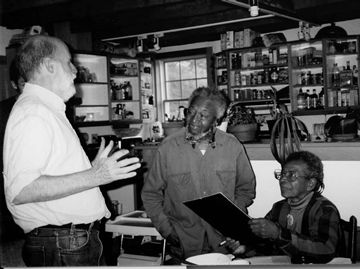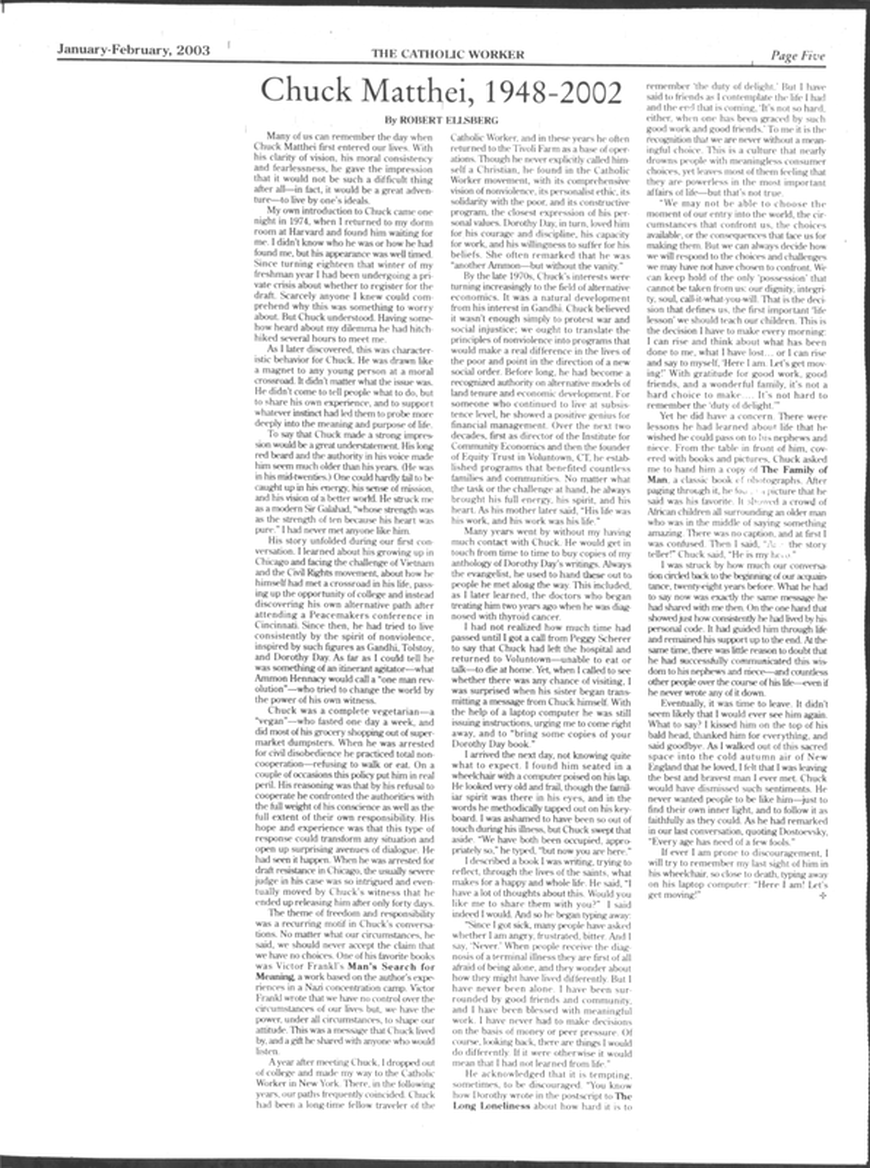|
(Chuck Matthei (left) with Wally and Juanita Nelson. Photo: Peggy Scherer) This year, we mark the 20th anniversary of the death of Chuck Matthei, a key member of VPT’s history. Chuck first arrived at VPT the morning after the barn was burned in October 1966. At the time, VPT was known as the CNVA Farm, and Chuck had previously met several people involved in the wider CNVA community through Peacemakers and the Catholic Worker. During his days of itinerant activism, Chuck made the Peace Trust another one of his homes. Influenced by Gandhi and interested in nonviolent economics, Chuck became involved with Bob Swann's work on community land trusts after arriving at VPT. Bob invited Chuck to join the board of the Institute for Community Economics (ICE), which was based in Voluntown and then Boston.. Chuck became the Executive Director of ICE and moved the organization to Greenfield, MA. Chuck ultimately left ICE to develop his Equity Trust program into an organization which moved back to the Peace Trust in 1991. He had the old sauna renovated, but he hadn’t lived in it for long before he became ill with cancer. He died at Ahimsa where he was taken care of, and visited by, many friends. Directly below is Chuck Matthei’s obituary written by Joanne Sheehan for the War Resisters League magazine Nonviolent Activist in 2002. Below that is Robert Ellsberg’s reflections on Chuck’s life, work, and philosophy. -- Born on Valentine’s Day in 1948 in Wilmette, IL, Chuck opposed the growing war in Vietnam and decided to resist the draft by the time he was 18. He often told the story of staying with Wally and Juanita Nelson on his way to a Peacemakers Orientation Program. Wally told Chuck “Our house is your house, for as long as you need it. You’re always welcome here.” Wally, who died five months before Chuck (see NVA, July-August 2002) remained one of his closest friends. Throughout his life, he offered hospitality and encouraged others to do the same. Chuck remained close to movement “elders” like Ernest and Marion Bromley, Maurice McCrackin, Dorothy Day and Marj Swan, all of whom he met at the Peacemakers gathering. He spent time at the Peacemakers community in Cincinnati, the Catholic Worker Farm in Tivoli, NY, and the Community for Nonviolent Action (CNVA) in Voluntown. Chuck also befriended Lolita Lebrun, the Puerto Rican independence activist, visiting her at the women’s prison in Alderson, WV. Inspired by World War II total resister Corbet Bishop, Chuck became a total resister, refusing to work, walk, eat or drink when arrested. Arrested for draft resistance in February 1969, Chuck noncooperated as he was brought back to Chicago for trial. After discussions with him, the judge, who usually sentenced draft resisters to five years in prison, dropped the charges the next month. Chuck’s charisma often had a transformative effect on those who met him. Chuck and I were in the same New Hampshire armory after being arrested for occupying the Seabrook nuclear power plant in 1977. He went 11 days without food or water. I watched as Chuck interacted with a National Guard doctor who initially came to convince Chuck to eat, but developed a deep respect for him. Chuck spent a lot of time on the road, connecting with people and connecting people, participating in actions and inspiring people to act. In telling the story of the western Massachusetts Traprock Peace Center, Randy Kehler credits Chuck “the ever-present cross pollinator of the movement” for bringing together the people who then developed the Nuclear Weapons Freeze campaign. Chuck lived at New England CNVA while Bob Swann developed his community land trust philosophy. Chuck’s approach to poverty and inequality linked activism, economics and property issues into a powerful political message. From 1980 to 1990 Chuck served as Executive Director of the Institute for Community Economics (ICE), then based in Greenfield, MA, and now located in Springfield, MA. ICE pioneered modern community land trust and loan fund models. As Founder and Director of Equity Trust, Inc. (founded in 1991 and based in Voluntown at the site of the old CNVA farm), he focused on alternative models of land tenure and economic development. Equity Trust has provided technical and financial assistance to projects all across the United States and in Central America and Kenya. Two-and-a-half years ago, after learning that Chuck had terminal cancer, I encouraged him to write an article that would explain his understanding of nonviolent economics. Together we wrote “Toward a Nonviolent Economics,” for WRL’s Guns Greed Globalization. (An edited version appears in NVA, May/June 2001.) Chuck touched many people deeply with his conscience, discipline and commitment. His work on economic alternatives has made a difference in many lives. Even though Chuck didn’t live long enough to become an elder, he lived an incredibly full life. —Joanne Sheehan Joanne Sheehan, organizer for WRL/New England, first met Chuck in the WRL building in the early 1970s. More on Chuck and his work can be found on www.equitytrust.org. -- (Click on the image below to download the PDF, or see the whole issue at The Catholic Worker) —
Support Us If you like our weekly posts, please consider supporting this project with a one-time or recurring donation. Contributions of all sizes are appreciated. Click this link to learn more about what we do and how you can donate: https://www.mightycause.com/organization/Voluntown-Peace-Trust — Sources Ellsberg, Robert. “Chuck Matthei, 1948-2002.” The Catholic Worker. 1 January 2003. https://thecatholicnewsarchive.org/?a=d&d=CW20030101-01.2.11&e=-------en-20--1--txt-txIN-------- Sheehan, Joanne. “Chuck Matthei, 1948-2002.” Nonviolent Activist. November-December 2002. Second article in the link: https://www.warresisters.org/nva/chuck-matthei-1948-2002 Comments are closed.
|
AuthorWrite something about yourself. No need to be fancy, just an overview. Archives
March 2023
Categories |


 RSS Feed
RSS Feed